Understanding the meaning of Halal and Haram
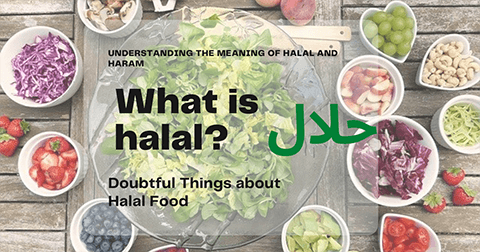
This article outlines the definition of halal, its origins, and the requirements it must meet to be considered halal. This also answers the question; is chicken halal or is poultry halal? is halal humane? what is a ritual slaughter? what is the difference between the kosher and halal food supply chain and food industry?
Halal definition (What is Halal?)
HALAL حلال Is an Arabic word that means “permissible.” Which means lawful and permitted in Islam, according to Islamic law (Shari’ah). It can, and is applied to any subject matter.
Halal food is any food fit for Muslim consumption, it is the Islamic dietary standard, as prescribed in the Shari’ah (Islamic Law). Some Ahadeeth and Verses from the Holy Qur’an define which foods a person can and cannot eat, and also how they should produce and handle certain foods, animals to be considered permissible for consumption. This also states which combinations of foods, animals that Muslims should avoid.
HARAM: This is another Arabic term that means impermissible or unlawful in Islam. It is a combination of foods that Muslim people should avoid eating or dealing with.
All good things in this world are halal and all bad things in this world are haram. Halal and Haram are not just limited to human actions and behavior. It is also applied to things and objects including food.
Terminology
Halal حلال – it is an Arabic word meaning lawful and permitted in Islam
Haram – it is an Arabic word meaning impermissible or unlawful in Islam
Mushboh – it is an Arabic word meaning Questionable
Najis – FILTH, refers to all forms of impurity.
Halal meaning in Islam and halal origins
For us Muslims it is not just about avoiding haram, It means being free from najis and from any form of contamination with haram components and harmful organisms, it is how we prepare and handle certain foods, and what foods are allowed to combine with other foods, and most importantly it is about pleasing Allah (SWT). As the Prophet Mohammad (Sallallahu Alayhi Wasallam) said: “Allah is pure, and only accepts what is pure.” Read articles about The Doubtful Things between Halal and Haram to know more.
Abu Huraira reported: The Messenger of Allah, peace, and blessings be upon him, said, “O people, Allah is Pure and He only accepts what is pure. Verily, Allah has commanded the believers as He has commanded His Messengers. Allah said: O Messengers, eat from wholesome foods and act righteously, for I know what you do (23:51). And Allah said: O you who believe, eat from wholesome food We have provided for you,” (2:172). Then, the Prophet mentioned a man who traveled far, becoming disheveled and dusty and he raises his hands to the sky, saying, “O Lord! O, Lord!” Yet his food is unlawful, his drink is unlawful, his clothing is unlawful, and he is nourished by the unlawful, so how can he be answered?
Source/Authors: Ṣaḥīḥ Muslim 1015
Grade: Sahih (authentic) according to Muslim
So by consuming halal we ensure that we have the blessings of Allah in our lives. We become those that the supplications accepted, and become those who are beloved to Allah. All praise is to Allah alone and Allah knows best.
Religious views, Hadith and Qu’ranic verses regarding halal:
The Prophet Mohammad (sallallahu alayhi wasallam) said: “Halal is clear and the Haram (unlawful) is clear. Between the two there are doubtful matters concerning which people do not know. One who avoids them in order to safeguard his deen (religion) and his honor are safe, while if someone indulges in it, he may be indulging in the unlawful……” (Bukhari)
According to general Qur’anic guidance, all foods are Halal except those specifically prohibited or described as Haram. The Glorious Qur’an reads:
“O ye who believes! Eat of the good things wherewith we have provided you, and render thanks to Allah if it is He whom ye worship. (chapter 2, verse 172)”
Following are the verses in the Glorious Qur’an that list the unlawful foods:
“He hath forbidden you only carrion, and blood, and swine flesh, and that on which hath been invoked any other name besides Allah’s……..” (Holy Qur’an chapter 2, verse 173)
“Forbidden unto you (for food) are: carrion and blood and swine flesh, and that on which hath been invoked the name other than Allah, and the strangled, and the dead through beating, and the dead through falling from a height, and that which hath been gored to death, and the devoured of wild beasts, saving that which ye make lawful (by slaughter) and that which hath been immolated to idols and that ye swear by the divining arrows. This is an abomination….” (Holy Qur’an Chapter 5, Verse 3)
According to the following guidelines, alcohol and other intoxicants are prohibited:
“O ye who believe! Intoxicants and games of chance, and idols and divining arrows are an abomination of Satan’s handiwork. Leave it aside in order that ye may succeed.” (Holy Qur’an chapter 5, verse 9)
Meat is the most strictly regulated food group. Blood, pork, and meat of dead animals and those sacrificed to deities other than Allah are prohibited, but Halal animals must also be slaughtered while pronouncing Allah’s name at the time of slaughter.
“Eat of that over which the name of Allah hath been mentioned, if ye are believers in his revelations”
(Holy Qur’an chapter 6, verse 118)
“And eat not of that whereon Allah’s name hath not been mentioned, for lo! It is abomination. Lo! The devils do inspire their friends to contend with you. But if ye obey them, ye will be in truth idolaters”. (Holy Qur’an chapter VI, verse 121)
What are halal foods
In terms of food, there are certain products that Islamic law does not allow Muslims to consume. These forbidden foods or ingredients are known as Haram, which means unlawful or prohibited.
In relation to food and drink, the main items that are Haram under Islamic law are alcoholic beverages, any part of a pig, carrion (meat of dead animals), carnivorous animals, and blood. Islamic Law also stipulates that all meat consumed must be from animals that have been slaughtered in accordance with Islamic law, thus making it Halal or acceptable for consumption. To satisfy Islamic law, slaughter is done by cutting the animal’s jugular vein as this includes rapid and complete bleeding.
Halal food categories:
• Plants:
all kinds of plants are halal except those that are poisonous, hazardous to health, and intoxicating.
• liquids:
all kinds of liquids are halal except those that are intoxicating, hazardous to health, poisonous, and those that are mixed with filth (najis)
• Animals:
Halal animals are divided into two categories: Aquatic and land animals.
All Animal meat
excluding fish and locusts will only be considered Halal when they are slaughtered according to the Shariah guidelines
- All domestic birds
- All cattle
- Sheep
- Goats
- Camels
- All types of buck
- Rabbits
- Fish
- locusts are in fact, the only halal insect in local diets.
Halal certification and halal byproduct certification
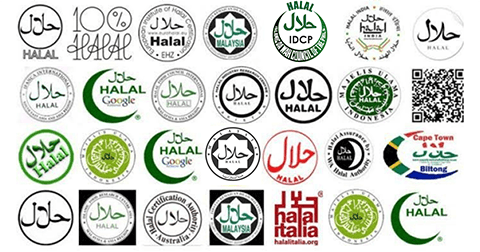
Halal products –
are products that comply with Islamic laws. It is a product that is fit for human consumption and also suitable for Muslim consumption. It does not necessarily imply, however, that it is restricted to Muslims only. Rather, it means that it is clean and healthy.
Halal Certification –
It is a document that certifies that products and services aimed at the Muslim population comply with Islamic law and therefore are suitable for consumption both in Muslim-majority countries and in Western countries where substantial populations practice Islam (Europe, North America, and South America, and Asian Countries). Certification as Halal is a process that ensures the features and quality of the products in accordance with the rules established by the Islamic Council which authorize the use of the Halal mark.
It is mainly applied to meat and other food products, such as milk, canned foods, and additives. The Halal certification specifically certifies that meat products have not been in contact with other animals or, especially, pork, and that animals were slaughtered in a single cut and that the meat had been thoroughly bled.
When a product is Halal certified, it will usually be marked with a Halal حلال symbol, or simply with the letter M (as the letter K is used to identify kosher food or products for Jewish people and V for Vegan). The Halal حلال symbol has become a seal of approval that assures the products are in compliance with Islamic dietary requirements and lifestyles and have the highest levels of quality, cleanliness, and health.
Halal Processing –
A product that is halal is one that is prepared, processed, stored, transported, and served in compliance with strict halal standards. In addition, an area/place and the equipment and utensils used must be exclusively dedicated to the processing of halal and halal by-products and must be free from najis and from contamination with haram substances.
Halal Ingredients –
As a rule, all halal ingredients mentioned above except those that are poisonous, dangerous to health, intoxicating, and those that are mixed or contaminated with filth or haram substances.
For animals, the ingredient must not contain any components of haram animals or halal animals that were not slaughtered in accordance with Islamic law.
For plants, it must not be poisonous, hazardous to health, or intoxicating
All liquids are halal except those that are intoxicating, poisonous, or dangerous to health and those that are mixed with najis. Generally, all liquids that are intoxicating are haram. Thus, alcoholic drinks and wine are not halal and cannot be used for producing halal food, nor can they be stored with a halal product or inside halal premises.
Others: The ingredient must have been prepared, processed, and stored according to halal standards.
Work Place –
The purpose of slaughtering is to let the blood out and use the flesh of the animal as food and thereby remove the slaughtered animal from the category of “dead animal”. There must be a separate area or facility that processes or serves halal by-products exclusively. Dedicated storage equipment or a room must be provided for halal by-products/materials/ingredients. It is mandatory that halal premises have Muslim halal assurance officers or halal crew. Halal standards / GMP / Hygiene and Sanitation, and other safety management systems must be strictly observed in all operations.
Halal in the food industry
As a general rule, and in light of the above, food must conform to the Islamic law in the Holy Qur’an, the traditions of Prophet Muhammad (SWS), and the teachings of Muslim scholars to be considered Halal. In other words, this implies that the food is safe to consume and is fit for human consumption. Among the most important conditions for food manufacturers are:
- All prohibited substances and ingredients must not be present in the product.
- The product needs to be made with appropriate utensils and machinery, and it cannot have come into contact with a prohibited substance or product during its manufacture, processing, storage, or transportation.
- The permitted animals must be slaughtered without unnecessary suffering and must meet the conditions stipulated.
- Fish are generally considered Halal.
- Preservatives, colorings, flavourings, and additives which are halal are permitted.
- For animal feed, vegetable ingredients must be used.
In addition to the requirements for food labeling, some other requirements are outlined:
- Halal or equivalent should be indicated on the label of the food.
- A Halal claim should not be used in a way that might raise questions about the safety or quality of similar foods, or in a manner that implies that Halal origins are more nutritionally superior than other foods.
Animal slaughtering ritual in Islam (How is meat slaughtered?)
A Muslim slaughterman is necessary. It is a mandatory requirement that the slaughterman invoke Allah’s name before slaughtering an animal by saying “Bismillahi Allahu Akbar” or even “Bismillah” least. After the recital, the animal must be immediately slaughtered without significant delay. In order to minimize the suffering of the animal, the knife must be extremely sharp. In addition, It is necessary to sever the arteries that carry blood to the lungs (trachea and esophagus) and the jugular veins. For meat to be rendered halal, the slaughterman must cut at least three of the four arteries if he cannot cut all four. The slaughter must be done manually (hands-on) and quickly. It is important not to lift the knife until the cut is complete and that the cut is below Adam’s apple.
What must a Muslim avoid? (Haram)
Haram Considered Animals
The following animals are prohibited from being consumed according to Islamic dietary laws. Muslims are also prohibited from consuming any ingredient or product derived from or contaminated with them:
- Animals that are not slaughtered according to the Islam method
- Meat of pig or swine including all its by-products
- Meat of an animal that was not blessed with the name of Allah at the time of slaughter
- Carrion meat or dead animals meat
- Meat of animals that were strangled to death
- Meat of animals that were beaten to death
- The meat of animals that died due to falling from a height
- Meat of animals that were gored to death by a horn
- The meat of animals that were devoured by wild beasts
- Animals killed in a manner that prevents their blood from being fully drained from their bodies;
- Carnivorous animals with fangs, e.g. lions, dogs, wolves, tigers, etc…
- Birds of prey e.g. falcons, eagles, owls, vultures, etc
- animals that both live inland and in water, e.g. Amphibians, reptiles, snakes, crocodiles
- Mules and Asses
- Pests’ e.g. rats and scorpions
- Insects excluding locusts
Unlawful Organs of Animals Slaughtered as Halal
- Flowing Blood
- Male reproductory organ
- Testicles
- Female reproductory organ
- Pancreas
- Gall bladder
- Bladder
Haram Fluids
- All types of alcohol
- Blood
- Intoxicating of all types, including alcohol and drugs
What is kosher?
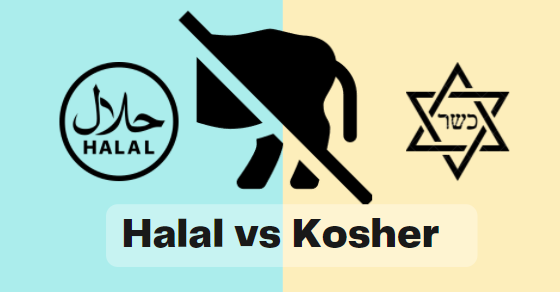
The concept of Halal is very similar to that of Kosher in Hebrew. Kosher means fit in Hebrew. A kosher product is any food that is fit for consumption by Jews. Laws of kosher define what foods are permissible and what foods are prohibited, and also how certain foods should be produced and handled. These laws also specify what food combinations people should avoid. The Torah, the first part of the Jewish bible, lays the foundation for kosher dietary laws. Jews follow a kosher diet because they believe it is God’s will. Read more about the kosher rules.
Difference between Kosher and Halal
There are several differences in food laws between kosher and halal. Below are some of the differences between the two major world religions food laws, according to Mustafa Farouk at the 2013 International Congress of Meat Science and Technology, provided by Texas A&M University, Kashrut: Jewish Dietary Laws:
- Both kosher and halal rules prohibit eating pork.
- Halal law requires praying to Allah before or while each animal is slaughtered, but kosher does not require prayer before each slaughter.
- A shochet, or specially trained rabbi, must slaughter the animal, while any adult Muslim, Christian, or Jew can slaughter the animal in halal law.
- Halal rules prohibit intoxication through wine, liquor, beer, or drugs, but kosher law does not.
- Kosher law prohibits mixing dairy and meat as well as the cooking, serving, and cleaning utensils used for them, but halal law does not.
- Kosher meats are acceptable if they meet halal standards, but halal meats are unacceptable to those following kosher rules.
- Slaughtering a stunned animal is accepted in halal law, but not in kosher rules, according to researchers.
- Halal rules allow for eating the whole animal, but kosher law prohibits eating the hindquarters.
- Residual blood in meat is fine in halal rules, but not in kosher rules, which call for rapid, complete draining of the blood at the time of slaughter.
Conclusion
Halal is very clear in Islam. Examples: All wholesome things, including lawful foods and drinks, clothes, good adornments, marriage, etc. since the basic principle refers to the permissibility of things as long as there is no text [from the Qur’an or Sunnah] that forbids.
The Haram is also clear and limited. Examples: dead meat, blood, the flesh of swine, wine intoxicants, killing others, perjury, ingratitude, theft, bribery, adultery, fornication, usury, interest, swearwords, insult, cheating, envy, hatred, lying, and other similar things that good people avoid.
Muslims permit all foods, pure and clean for consumption. Islamic Jurisprudence has derived certain principles from the Ahadeeth to determine whether a particular animal or bird is halal/lawful or haram/unlawful.
Muslim united, eating halal food holds religious significance.
Despite its many restrictions, a Halal diet can offer lots of benefits, nutritional balance, and ensure food safety and cleanliness.
Halal certification to foods has helped make the process of buying halal food easier for Muslims.
Finally, Be aware, be aware of what surrounds you, Don’t be lazy, ask and find out more about all halal things, Choose to be empowered with the knowledge to know just how halal your food truly is.
Learn more about halal through our recipes and halal articles. Photos in this blog were created using Canva. Jazakallahu Khair, Thanks for reading!
For more information on Halal, and Halal certifications, see more articles. Halalmc, Market report with volume, The Halal certification in the industry, What is Halal? A Guide for Non-Muslims, The multiplicity of halal standards:, Philippine National Standards on Halal, IDCP Halal, 10 Key Halal Certification Questions, When Muslim eat Kosher



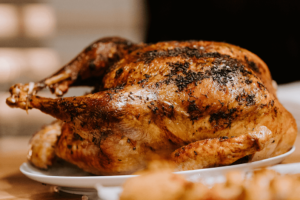
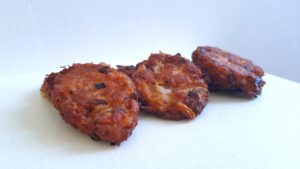
3 Responses
Great article Salymah. Would you be interested in writing for our blog and doing some SEO work for my company? We can work out a payment plan for your work on a monthly basis. Please let me know.
Salaam!
Salam sis, thank you for sharing this, very informative blogs
Thanks for reading, glad you liked it.